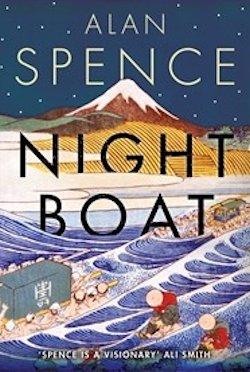At the foot of Mount Fuji towards the end of the 17th century, eight year-old Iwajiro attends a lecture on the Eight Hot Hells, and develops a burning fear of fire that will prove fundamental to his future.
Shaken, he asks his mother if there is any way of escaping damnation. A pious woman herself, she advises Iwajiro to attend the temple of Tenjin, where he is told to awaken each night at the hour of the Ox—that is to say 2 AM—and chant a certain sutra.
In this way, his unsettled soul finds slight respite, but in time his new-found faith divides his family. On the one hand, Iwajiro’s mother encourages her son, seeming to believe his devout behaviour will pave the way for something greater. His father, unfortunately—a businessman once poised to become a monk himself, who now neglects his own devotions—thinks it “ridiculous. You’ll turn him into a useless layabout, a lazy good-for-nothing with his head full of nonsense about burning in hell.”
Little does he know who or what his son will one day become.
Years later, Iwajiro still observes the hour of the ox, but it is no longer enough:
I got up every night, shocked myself awake with cold water, lit incense and sat chanting the sutras. It meant I began each day with a kind of strength and clarity, even if it faded as the day wore on. But lately it had been fading more and more quickly. Some little thing would jangle my nerves, make me angry, and it felt as if all the austerity was for nothing. Then that old fear of hell began to stir in me, and I was once again that frightened child, terrified of burning in the fires.
At bottom, Iwajiro has begun to feel the desires typical of a teen, but rather than simply submitting to them—them and the Eight Hot Hells he remains afraid they represent—he resolves to throw himself into the spiritual life. In short order, he leaves home, to apprentice at the temple in town, where the head monk rechristens him Ekaku, meaning Wise Crane.
His studies do not end here, however. Far from it! Before his thirtieth birthday, Ekaku has travelled from one end of Japan to the other, studying poetry, assorted sutras, koans and so on. He has seen the aftermath of a ghastly tsunami, and sat in a state of perfect concentration whilst Mount Fuji erupted around him, spitting fire and molten rock onto his family’s land. He has not conquered his fear of the Eight Hot Hells yet, but year after year, he grows closer to his goal.
Night Boat by Alan Spence is a fictionalised account of the legendary Zen master Hakuin Ekaku, whose practices are prevalent even today. You probably haven’t heard of him, but I warrant you will have heard of the reflective riddle he originated: what is the sound of one hand clapping?
Any guesses? Anyone?
Well, worry not: assuming there is an answer, months and years of meditation are required before we stand a change of arriving at it—and even then, there are no guarantees. In many ways, this is the basis of the teachings that Hakuin made famous.
Night Boat is of course historical fiction first and foremost, yet it is rich with myth and mysticism. It is “a thing of magic and enchantment [both] terrifying and magnificent” in turn. Like its subject, Night Boat is a story “haunted by hungry ghosts and malevolent spirits.” And yes, there’s a quest… though Haukuin’s search is for a sense of self rather than some all-powerful bauble.
After an unpleasant run-in with an old priest who believes he is “debasing the Dharma,” Hakuin reflects as follows:
I thought I could make a story of the incident, tell a tale that might reach some of those very lay followers he had been talking about. The Buddha’s message had to spread ever wider. Beat the Dharma drum.
I would give the story a supernatural element, make it an otherworldly tale of spirit possession, a message from beyond. […] Another tale from the Night Boat.
Alan Spence’s latest is a labour of love, ultimately: an account of a life lived long ago, the effects of which are still felt by many. It’s episodic, certainly, and at points inherently repetitive, yet the author—an award-winning poet and playwright, and manager in the erstwhile of the Sri Chinmoy Meditation Centre in Edinburgh—manages to fashion a fascinating narrative from a scant few facts.
And unlike the Lotus Sutra—a pivotal text that disappoints Hakuin early on, as he finds “the density and weight of [the words] hard work”—the precise prose of Night Boat is reasonably easy to read, plus it’s punctuated by soaring poetry and prone, in the moment, to flights of fabulous fantasy.
To be sure, Night Boat is a tall tale, but a true one too.
Night Boat is available now from Canongate Books.
Niall Alexander is an erstwhile English teacher who reads and writes about all things weird and wonderful for The Speculative Scotsman, Strange Horizons, and Tor.com, where he contributes a weekly column concerned with news and new releases in the UK called the British Genre Fiction Focus, and co-curates the Short Fiction Spotlight. On occasion he’s been seen to tweet, twoo.










